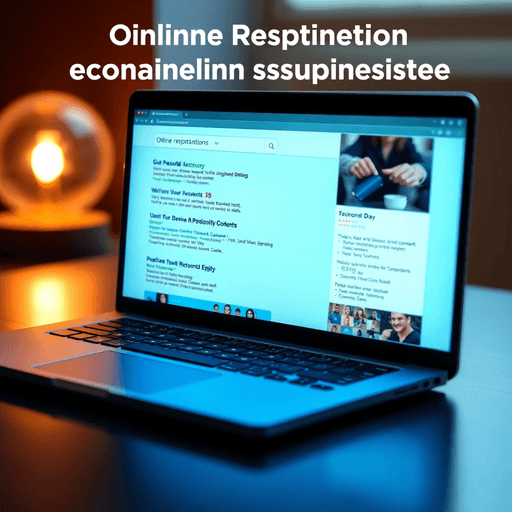Online reputation management for small business is the ongoing process of shaping, monitoring, and influencing how your company appears online. Every review, social media mention, and search engine result contributes to your small business reputation—often before a potential customer even walks through your door.
Why Online Reputation Management Matters
- Digital presence directly impacts brand perception. Customers form opinions about your business based on Google search results, directory listings, and reviews left on platforms like Yelp or Facebook. This highlights the importance of individual online reputation management strategies for success.
- Trust is currency. A positive online image attracts new customers and reassures existing ones that you value transparency and quality service. To boost brand trust with online reputation tips, it’s essential to build brand credibility with positive reviews, engaging content & social media presence.
- With competition just a click away, maintaining a strong digital reputation becomes essential. Even one negative article or outdated critique can sway public opinion. Implementing fast reputation repair strategies can revamp your reputation swiftly ensuring damage control and a strong online presence for future resilience.
Small businesses that prioritize proactive online reputation management consistently see higher trust levels, better customer retention, and increased sales opportunities. This involves creating a positive brand image through effective storytelling strategies in marketing which builds emotional connections, strengthens brand identity, and fosters trust. Understanding the importance of brand image in marketing can help unlock the power of brand image to boost reputation, attract top talent, and drive customer loyalty.
The Digital Landscape and Its Impact on Small Business Reputation
Google plays a crucial role in determining your business identity and shaping customer perception. When potential customers search for your business, Google curates a snapshot of your online presence through search results, reviews, and local listings. Ensuring that this snapshot is positive and accurate is crucial for protecting your digital image.
The Importance of Local Search Results for Small Businesses
Local search results are particularly significant for small businesses. When users search for services “near me,” Google prioritizes businesses with optimized Google My Business (GMB) profiles. A well-managed GMB profile can boost your local search rankings, making your business more visible to nearby potential customers. Essential elements of an optimized GMB profile include:
- Accurate business information (name, address, phone number)
- High-quality images
- Regularly updated posts and offers
- Prompt responses to reviews
Dealing with Negative Content on Google Search Results
However, there may be instances where negative content appears on Google search results. In such cases, removing negative content from Google becomes essential to rebuild your reputation.
Maintaining a well-managed GMB profile is vital, but there might be situations where you need to remove your Google Business Profile to protect brand consistency and online presence.
The Role of Multiple Review Platforms in Shaping Business Reputation
Multiple review platforms also play a critical role in shaping your business reputation. Reviews on Google, social media platforms like Facebook, and directories such as Yelp contribute to the overall perception of your brand. Each platform has its own audience, and managing reviews across these channels ensures a consistent positive image.
Key points to focus on:
- Encourage satisfied customers to leave positive reviews by showcasing 5-star review examples.
- Monitor review platforms regularly using ORM tools.
- Respond professionally to both positive and negative feedback.
If negative reviews persist, it’s important to implement effective public relations strategies to boost your brand image.
Integrating SEO Strategies with ORM Efforts
Maintaining a positive presence across these platforms not only enhances customer trust but also improves your SEO performance. Integrating SEO strategies with ORM efforts can further elevate your brand’s visibility and credibility.
Effective online reputation management in this digital landscape requires active participation across multiple fronts to ensure that small businesses remain competitive and reputable.
Why Online Reputation Management is Crucial for Small Businesses
Direct Impact on Customer Acquisition and Retention
Managing online reviews effectively is crucial for small businesses. Positive online feedback has a significant influence on customers’ purchasing decisions. When potential clients see favorable reviews, they are more likely to choose your business over competitors. On the other hand, negative reviews can turn away potential customers, resulting in significant losses in acquiring new clients.
Risk of Negative Content
Negative content can seriously harm the reputation of small businesses. Studies show that a single negative article can cost a business up to 22% of potential customers. If three negative articles appear in search results, the potential loss increases to 59%. This highlights the importance of actively managing your online presence to minimize the impact of harmful content.
ORM for Small Businesses vs. Corporations
Online reputation management (ORM) differs greatly between small businesses and large corporations:
- Scale: Corporations usually have dedicated teams and larger budgets to handle ORM, while small businesses may rely on a few individuals or external services.
- Customer Interaction: Small businesses typically have closer interactions with their customers, making personalized responses more important.
Why It Matters
Small business owners must prioritize ORM to protect their brand image, attract new customers, and retain existing ones. By effectively managing online reviews and promptly addressing negative feedback, you build trust and credibility—essential elements for long-term success.
In today’s digital age, where first impressions are often formed through online searches and reviews, maintaining a positive online reputation is not just beneficial; it is necessary.
Key Components of Effective Online Reputation Management
Managing online reviews is not a one-time task—it’s a continuous process demanding vigilance and strategic action. Small businesses that thrive understand the importance of using review monitoring tools and software dashboards to keep a finger on the pulse of their digital presence. These platforms—such as FMRO’s dashboard, Google Alerts, or ReviewTrackers—provide instant notifications about new mentions or reviews across multiple sites, including Google, Yelp, Facebook, and industry-specific directories.
1. Active Review Monitoring
Consistently track customer feedback on all major platforms. Use sentiment analysis features to quickly identify negative trends or spikes in positive online reviews. Set up automated alerts to respond before small issues escalate.
2. Requesting Positive Online Reviews
Integrate review requests into post-purchase email workflows. For example, after a service is rendered, an automated follow-up email can politely invite customers to share their experience. Encourage sharing through social media by providing direct links for easy access to review forms. Offer incentives such as discounts or loyalty points only if it aligns with platform guidelines and doesn’t compromise authenticity.
3. Professional Response to Feedback
Respond promptly to both praise and criticism; thank happy customers for their support and acknowledge dissatisfied clients with empathy and solutions. Stay professional even when facing unfair critiques—address facts, clarify misunderstandings, and offer to resolve issues offline if necessary. Regular, public engagement shows prospective customers you value feedback and are dedicated to continuous improvement.
“A single negative review may lose you dozens of potential customers—but a thoughtful response can win them back.”
Mastering these elements equips small businesses with the agility needed to protect and enhance their reputation in an unpredictable digital landscape. To manage and repair your online reputation effectively, consider using some proactive monitoring tips. Additionally, understanding how to request positive online reviews can significantly improve your online presence. In case of negative feedback, make use of these expert-backed DIY online reputation management tips for better handling.
Enhancing Brand Visibility Through SEO and ORM Integration
Integrating SEO brand perception into online reputation management (ORM) is crucial. By improving search engine rankings through strategic keyword targeting, you ensure that your business remains visible to potential customers. Keywords relevant to your industry and services help position your website higher on search results, making it easier for customers to find and trust your brand.
Effective website optimization is another essential aspect. Elements such as meta descriptions, alt tags, and structured URLs significantly boost your visibility. Meta descriptions provide a brief summary of your webpage content, encouraging users to click through from search results. Alt tags describe images on your site, helping search engines understand their context and improving accessibility. Structured URLs offer clarity about the page content, enhancing user experience and SEO performance.
Positive reviews are powerful tools for enhancing SEO performance. Search engines like Google prioritize websites with high ratings and positive feedback. Encouraging satisfied customers to leave reviews can elevate your business in local searches, increasing its credibility and trustworthiness.
By integrating SEO strategies with ORM practices, such as those offered by SEO Reputation Management Services, you create a robust online presence that attracts and retains customers. These services not only improve online reputation with advanced SEO strategies but also promote positive content effectively.
- Strategic keyword targeting: Improves search engine rankings.
- Website optimization elements: Meta descriptions, alt tags, structured URLs boost visibility.
- Leveraging positive reviews: Enhances SEO performance and credibility.
Combining these techniques not only reinforces your online reputation but also drives organic traffic to your site, ultimately supporting the growth of your small business.
Handling Negative Feedback and Protecting Your Digital Image
Quick Response to Negative Content and Harmful Campaigns
When faced with negative content, swift action is crucial. A prompt response can prevent the escalation of potentially damaging issues. Addressing concerns immediately shows customers that you value their feedback and are committed to resolving problems. This proactive approach not only mitigates the impact of negative comments but also demonstrates professionalism and dedication to customer satisfaction.
In some cases, it may be necessary to remove harmful online content or even eliminate negative posts entirely. Such expert content removal services can protect your online reputation swiftly.
Best Practices for Addressing Unfair Critiques and Outdated Information
- Stay Professional: Always maintain a professional tone, even when responding to unfair or harsh critiques. Avoid getting defensive or confrontational.
- Acknowledge the Issue: Validate the customer’s feelings by acknowledging their concerns, regardless of whether you agree with their viewpoint.
- Provide Solutions: Offer tangible solutions or steps you are taking to address the issue. This reassures customers that you are actively working to improve their experience.
- Update Information: Regularly review online information about your business to ensure it is current. Address outdated information promptly to prevent misinformation from influencing potential customers.
- If outdated information is linked to a business listing on Google, consider following a step-by-step guide to safely remove your business listing from Google.
Using Crisis Plans to Manage Negative Publicity Transparently
Developing a crisis management plan is essential for handling negative publicity effectively. Key elements of a robust crisis plan include:
- Prepared Statements: Have pre-drafted responses ready for various scenarios to ensure quick and consistent communication.
- Designated Spokesperson: Assign a spokesperson responsible for addressing public concerns and maintaining transparency.
- Monitoring Tools: Utilize tools like FMRO’s sentiment analysis software to monitor mentions and detect harmful content early.
- Confidentiality Commitment: Ensure all actions taken during crisis management uphold confidentiality standards, protecting both your business and customer privacy.
These strategies collectively contribute to digital image protection, helping small businesses suppress damaging content while maintaining trust with their audience.
Building Trust Through Social Proof and Customer Engagement Strategies
Positive reviews play a crucial role in establishing credibility with potential customers. They act as social proof, showcasing real experiences and satisfaction levels from other users. When a small business accumulates positive feedback, it builds a trustworthy image that can attract more clients. Encouraging happy customers to leave reviews on platforms like Google, Yelp, and social media can significantly enhance your online reputation.
Engaging regularly with customers through review responses and social media interactions is another effective strategy. Acknowledging both positive and negative feedback demonstrates that you value customer opinions and are committed to continuous improvement. Prompt responses not only address concerns but also show prospective clients that you are proactive in maintaining high service standards.
Partnering with influencers or local businesses can generate positive mentions and expand your reach. Influencers with a loyal following can provide authentic endorsements, while collaborations with local businesses can help build a supportive community network. These partnerships increase your visibility and add another layer of credibility to your brand.
Key Points:
- Positive Reviews: Act as social proof, enhancing credibility.
- Customer Engagement: Regular interactions through review responses and social media.
- Partnerships: Collaborations with influencers and local businesses for positive mentions.
By integrating these strategies into your online reputation management efforts, you can build a robust trust foundation with your audience, paving the way for sustained business growth.
Tools, Resources, Case Studies For Small Business Online Reputation Management Success Stories With FMRO
Managing your online reputation as a small business requires the right set of tools and a proactive strategy. Advanced ORM tools for small business now offer consolidated dashboards that simplify review monitoring across platforms like Google Maps, Yelp, Facebook, and industry-specific directories. With reputation monitoring software such as FMRO’s proprietary tool, you gain instant notifications about new reviews, mentions, or suspicious activity—including false reviews or spam campaigns targeting your brand.
Key features to look for in modern ORM tools:
- Unified Dashboard: Track all your reviews and ratings from one place—no more logging into multiple sites daily.
- Sentiment Analysis: Understand not just what customers are saying but how they feel. Automated sentiment scoring helps identify emerging issues before they escalate.
- Instant Alerts: Receive real-time notifications when negative content appears or your brand is mentioned unexpectedly. This allows for rapid response and damage control.
- Automated Reporting: Generate comprehensive reports on review trends, star rating progression, and competitor comparisons.
Technology can empower action, but strategy delivers results. Real-world success stories from FMRO clients reveal the impact of combining smart software with expert intervention:
- Suppressing Damaging Campaigns: One client faced an orchestrated attack with multiple fake negative articles targeting their business name. Using FMRO’s monitoring suite and legal resources, these articles were identified quickly and removed through proper channels.
- Rapid Rating Recovery: A local service provider struggled with a low 1-star average after an influx of unfair reviews. By actively encouraging satisfied customers to share honest feedback via automated email requests and social media prompts (all managed within the dashboard), their average rating climbed to 4 stars in under three months.
- Personalized Confidential Support: Every recovery process is conducted with strict confidentiality. Clients’ identities and sensitive information remain protected during content removal or persona rebuilding efforts—learn more about our Business Reputation Management commitment.
Access to robust ORM tools for small business is only part of the equation. When paired with strategic outreach and expert guidance from a team like FMRO, businesses gain the confidence to address threats head-on while building long-term credibility in their market.
Moreover, it’s crucial to understand that proactive reputation monitoring can safeguard your online reputation & alert you to risks early. Incorporating crisis management techniques can also help protect your brand & maintain reputation in tough times. For more insights on protecting your digital image and managing online reviews, you can explore our extensive collection of Blog articles on Online Reputation Management.
Why Small Business Owners Should Prioritize Investing in Online Reputation Management for Long-Term Growth
Proactive online reputation management for small businesses is no longer optional—it’s essential. By consistently monitoring, responding, and engaging with your online presence, you protect your brand from unexpected threats and negative stories.
The benefits of investing in ORM go beyond just handling crises:
- Enhanced credibility: Customers are much more likely to trust a brand with a strong, positive online presence.
- Sustained growth: Positive reviews and high ratings attract new clients and keep existing ones loyal.
- Competitive advantage: A well-managed reputation sets you apart in crowded markets.
Neglecting online reputation management brings risks, while making it a priority opens doors to long-lasting success. As search engines and review platforms continue to influence buying decisions, integrating ORM into your daily operations ensures your small business grows on its own terms—trusted, respected, and resilient.
To achieve this, mastering corporate reputation management is crucial. This involves not only handling crises but also enhancing brand value through effective corporate communication strategies. A strong digital reputation is vital for success, attracting talent and increasing market value. Therefore, effective business reputation management strategies should be implemented to build, protect, and restore your brand’s online presence.
Additionally, understanding the value proposition of your brand plays a significant role in excellent reputation management. It distinguishes your brand and effortlessly attracts loyal customers. Lastly, mastering reputation crisis management can help you navigate through difficult times successfully.






